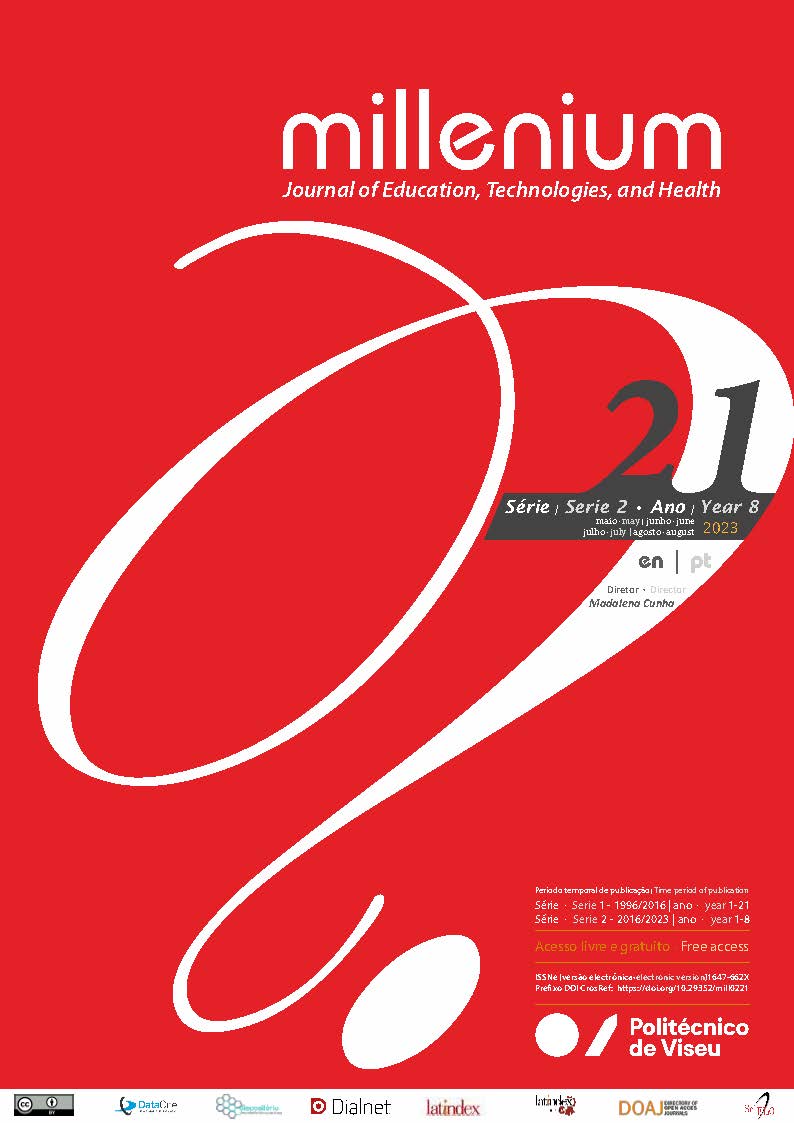Nursing interventions to prevent post-traumatic stress disorders in people in intensive care: scoping review protocol
DOI:
https://doi.org/10.29352/mill0221.27671Abstract
Introduction: People who need hospitalization in Intensive Care (CI) are people exposed to stress factors, because it is a limited physical context, with artificial light and permanent noise. Added to these factors is the hostile and emotionally exhausting environment resulting from the complexity of the care needed for the person in a critical situation (Correia, 2020), making them vulnerable and at risk of developing Post Traumatic Stress Disorder (PTSD). There is currently a vast literature on PTSD, however, existing research on the role of nurses in the prevention of SPT in people hospitalized in CI is scarce.
Objetive: To map nursing knowledge on nursing interventions that help prevent PTSD in inpatients in the context of CI.
Methods: Scoping Review according to the Joanne Briggs Institute’s (JBI) methodology.
The research strategy will map published studies. The databases included will be: PUBMED, CINAHL via EBSCO, JBI Database of Systematic Reviews, COCHRANE Database of Systematic Reviews, Portuguese Open Access Scientific Repository, OpenGrey and Dart-Europe. This review will integrate articles focusing on nursing interventions that help prevent post-traumatic stress disorder in inpatients in the context of intensive care and will include quantitative, qualitative or mixed studies, as well as systematic reviews, guidelines and gray literature.
Results: It is hoped to identify the nursing interventions that are determinant for the prevention of PTSD in inpatients in the context of CI
Conclusion: The results of this review will show the role of nursing in the prevention of PTSD of the inpatient in the context of CI, raising awareness of this issue, specifically to achieve highly significant and clinically relevant outcomes in this area.
Downloads
References
Associação Americana de Psiquiatria. (2014). Manual Diagnóstico e Estatístico de Transtornos Mentais DSM. (5ª ed.). Artmed. https://www.academia.edu/51009051/DSM_5_Manual_Diagn%C3%B3stico_e_Estat%C3%ADstico_de_Transtornos_Mentais_2014_
Carvalhão, G. L. & Aleixo, M. A. (2021). Perturbação de Stress Pós-Traumático Após Internamento em Unidade de Cuidados Intensivos. Centro Hospitalar Psiquiátrico de Lisboa, 1-4. https://revista.psiquiatria-cl.org/index.php
Correia, S. (2020). Stress e Burnout. In J. Pinho (Ed.), Enfermagem em Cuidados Intensivos 48 - 56. Lidel.
Lomax, J. (2021). How diaries help ICU patients recover. Kai Tiaki Nursing New Zealand, 27(7), pp. 40-41. https://kaitiaki.org.nz/article/how-diaries-help-icu-patients-recover/
Nielson, A. H., Angel, S. & Egerod, I. (2020). Effect of relatives´ intensive care unit diaries on post-traumatic stress in patients and relatives (DRIP-study): A mixed methods study. Intensive & Critical Care Nursing, 62, 1-8.
DOI: 10.1016/j.iccn.2020.102951
Pinho, J.A. (2020). O Doente e a Família na Unidade de Cuidados Intensivos. Enfermagem em Cuidados Intensivos, 311-320. Lidel.
Pinkas, J. & Horowitz, A. (2020). Reducing Severity of Posttraumatic Stress Disorder in Intensive Care Unit Survivors. Dimensions of Clinical Care Nursing, 39(6), 298-304. DOI: 10.1097/DCC.0000000000000439
Rachkorsky, L. L. & Mussi, C. A. K. (2022). Transtorno do estresse pós-traumático (TEPT): relato de caso. Revista Da Faculdade De Ciências Médicas De Sorocaba, 24(Supl.). https://revistas.pucsp.br/index.php/RFCMS/article/view/59647
Torres, L., Nelson, F. & West, G. (2020). Exploring the Effects of a nurse-Initiated Diary Intervention on Post-Critical Care Posttraumatic Stress Disorder. The American Journal of Nursing, 120(5), 24-33. DOI:10.1097/01.NAJ.0000662804.81454.66
Urden, L., Stacy, K. & Lough, M. (2006). Thelan´s Enfermagem de Cuidados Intensivos – Diagnóstico e Intervenção (5ª ed.). Lusodidacta.
Warlan, H., & Howland, L. (2015). Posttraumatic Stress Syndrome Associated With Stays in the Intensive Care Unit: Importance of Nurses’ Involvement. Critical Care Nurse, 35(3), 44–52. https://doi.org/10.4037/ccn2015758
Downloads
Published
How to Cite
Issue
Section
License
Copyright (c) 2023 Millenium - Journal of Education, Technologies, and Health

This work is licensed under a Creative Commons Attribution 4.0 International License.
Authors who submit proposals for this journal agree to the following terms:
a) Articles are published under the Licença Creative Commons (CC BY 4.0), in full open-access, without any cost or fees of any kind to the author or the reader;
b) The authors retain copyright and grant the journal right of first publication, allowing the free sharing of work, provided it is correctly attributed the authorship and initial publication in this journal;
c) The authors are permitted to take on additional contracts separately for non-exclusive distribution of the version of the work published in this journal (eg, post it to an institutional repository or as a book), with an acknowledgment of its initial publication in this journal;
d) Authors are permitted and encouraged to publish and distribute their work online (eg, in institutional repositories or on their website) as it can lead to productive exchanges, as well as increase the impact and citation of published work
Documents required for submission
Article template (Editable format)





